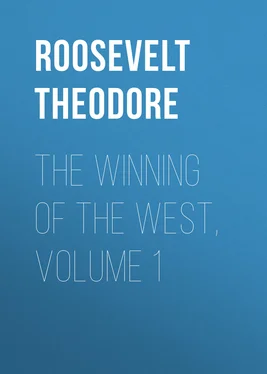Theodore Roosevelt - The Winning of the West, Volume 1
Здесь есть возможность читать онлайн «Theodore Roosevelt - The Winning of the West, Volume 1» — ознакомительный отрывок электронной книги совершенно бесплатно, а после прочтения отрывка купить полную версию. В некоторых случаях можно слушать аудио, скачать через торрент в формате fb2 и присутствует краткое содержание. Жанр: foreign_prose, История, foreign_edu, foreign_antique, на английском языке. Описание произведения, (предисловие) а так же отзывы посетителей доступны на портале библиотеки ЛибКат.
- Название:The Winning of the West, Volume 1
- Автор:
- Жанр:
- Год:неизвестен
- ISBN:нет данных
- Рейтинг книги:5 / 5. Голосов: 1
-
Избранное:Добавить в избранное
- Отзывы:
-
Ваша оценка:
- 100
- 1
- 2
- 3
- 4
- 5
The Winning of the West, Volume 1: краткое содержание, описание и аннотация
Предлагаем к чтению аннотацию, описание, краткое содержание или предисловие (зависит от того, что написал сам автор книги «The Winning of the West, Volume 1»). Если вы не нашли необходимую информацию о книге — напишите в комментариях, мы постараемся отыскать её.
The Winning of the West, Volume 1 — читать онлайн ознакомительный отрывок
Ниже представлен текст книги, разбитый по страницам. Система сохранения места последней прочитанной страницы, позволяет с удобством читать онлайн бесплатно книгу «The Winning of the West, Volume 1», без необходимости каждый раз заново искать на чём Вы остановились. Поставьте закладку, и сможете в любой момент перейти на страницу, на которой закончили чтение.
Интервал:
Закладка:
In the part of west Florida lying along the east bank of the Mississippi, there were also some French creoles and a few Spaniards, with of course negroes and Indians to boot. But the population consisted mainly of Americans from the old colonies, who had come thither by sea in small sailing-vessels, or had descended the Ohio and the Tennessee in flat-boats, or, perchance, had crossed the Creek country with pack ponies, following the narrow trails of the Indian traders. With them were some English and Scotch, and the Americans themselves had little sympathy with the colonies, feeling instead a certain dread and dislike of the rough Carolinian mountaineers, who were their nearest white neighbors on the east. 8 8 Magazine of American History , IV., 388. Letter of a New England settler in 1773.
They therefore, for the most part, remained loyal to the crown in the Revolutionary struggle, and suffered accordingly.
When Louisiana was ceded to Spain, most of the French creoles who formed her population were clustered together in the delta of the Mississippi; the rest were scattered out here and there, in a thin, dotted line, up the left bank of the river to the Missouri, near the mouth of which there were several small villages,—St. Louis, St. Genevieve, St. Charles. 9 9 "Annals of St. Louis." Frederic L. Billon. St. Louis, 1886. A valuable book.
A strong Spanish garrison held New Orleans, where the creoles, discontented with their new masters, had once risen in a revolt that was speedily quelled and severely punished. Small garrisons were also placed in the different villages.
Our people had little to do with either Florida or Louisiana until after the close of the Revolutionary war; but very early in that struggle, and soon after the movement west of the mountains began, we were thrown into contact with the French of the Northwestern Territory, and the result was of the utmost importance to the future welfare of the whole nation.
This northwestern land lay between the Mississippi, the Ohio, and the Great Lakes. It now constitutes five of our large States and part of a sixth. But when independence was declared it was quite as much a foreign territory, considered from the standpoint of the old thirteen colonies, as Florida or Canada; the difference was that, whereas during the war we failed in our attempts to conquer Florida and Canada, we succeeded in conquering the Northwest. The Northwest formed no part of our country as it originally stood; it had no portion in the declaration of independence. It did not revolt; it was conquered. Its inhabitants, at the outset of the Revolution, no more sympathized with us, and felt no greater inclination to share our fate, than did their kinsmen in Quebec or the Spaniards in St. Augustine. We made our first important conquest during the Revolution itself,—beginning thus early what was to be our distinguishing work for the next seventy years.
These French settlements, which had been founded about the beginning of the century, when the English still clung to the estuaries of the seaboard, were grouped in three clusters, separated by hundreds of miles of wilderness. One of these clusters, containing something like a third of the total population, was at the straits, around Detroit. 10 10 In the Haldimand MSS., Series B, vol. 122, p. 2, is a census of Detroit itself, taken in 1773 by Philip Dejean, justice of the peace. According to this there were 1,367 souls, of whom 85 were slaves; they dwelt in 280 houses, with 157 barns, and owned 1,494 horned cattle, 628 sheep, and 1,067 hogs. Acre is used as a measure of length; their united farms had a frontage of 512, and went back from 40 to 80. Some of the people, it is specified, were not enumerated because they were out hunting or trading at the Indian villages. Besides the slaves, there were 93 servants. This only refers to the settlers of Detroit proper, and the farms adjoining. Of the numerous other farms, and the small villages on both sides of the straits, and of the many families and individuals living as traders or trappers with the Indians, I can get no good record. Perhaps the total population, tributary to Detroit was 2,000. It may have been over this. Any attempt to estimate this creole population perforce contains much guess-work.
It was the seat of the British power in that section, and remained in British hands for twenty years after we had become a nation.
The other two were linked together by their subsequent history, and it is only with them that we have to deal. The village of Vincennes lay on the eastern bank of the Wabash, with two or three smaller villages tributary to it in the country round about; and to the west, beside the Mississippi, far above where it is joined by the Ohio, lay the so-called Illinois towns, the villages of Kaskaskia and Cahokia, with between them the little settlements of Prairie du Rocher and St. Philip. 11 11 State Department MSS., No. 150, Vol. III., p. 89.
Both these groups of old French hamlets were in the fertile prairie region of what is now southern Indiana and Illinois. We have taken into our language the word prairie, because when our backwoodsmen first reached the land and saw the great natural meadows of long grass—sights unknown to the gloomy forests wherein they had always dwelt—they knew not what to call them, and borrowed the term already in use among the French inhabitants.
The great prairies, level or rolling, stretched from north to south, separated by broad belts of high timber. Here and there copses of woodland lay like islands in the sunny seas of tall, waving grass. Where the rivers ran, their alluvial bottoms were densely covered with trees and underbrush, and were often overflowed in the spring freshets. Sometimes the prairies were long, narrow strips of meadow land; again they were so broad as to be a day's journey across, and to the American, bred in a wooded country where the largest openings were the beaver meadows and the clearings of the frontier settlers, the stretches of grass land seemed limitless. They abounded in game. The buffalo crossed and recrossed them, wandering to and fro in long files, beating narrow trails that they followed year in and year out; while bear, elk, and deer dwelt in the groves around the borders. 12 12 Do Harmar's letter.
There were perhaps some four thousand inhabitants in these French villages, divided almost equally between those in the Illinois and those along the Wabash. 13 13 State Department MSS, No 30, p 453. Memorial of François Carbonneaux, agent for the inhabitants of the Illinois country. Dec 8, 1784. "Four hundred families [in the Illinois] exclusive of a like number at Post Vincent" [Vincennes]. Americans had then just begun to come in, but this enumeration did not refer to them. The population had decreased during the Revolutionary war, so that at its outbreak there were probably altogether a thousand families. They were very prolific, and four to a family is probably not too great an allowance, even when we consider that in such a community on the frontier there are always plenty of solitary adventurers. Moreover, there were a number of negro slaves. Harmar's letter of Nov. 24, 1787, states the adult males of Kaskaskia and Cahokia at four hundred and forty, not counting those at St. Philip or Prairie du Rocher. This tallies very well with the preceding. But of course the number given can only be considered approximately accurate, and a passage in a letter of Lt-Gov Hamilton would indicate that it was considerably smaller. This letter is to be found in the Haldimand MSS, Series B, Vol. 123, p. 53, it is the 'brief account' of his ill-starred expedition against Vincennes. He says "On taking an account of the Inhabitants at this place [Vincennes], of all ages and sexes we found their number to amount to 621, of this 217 fit to bear arms on the spot, several being absent hunting Buffaloe for their winter provision." But elsewhere in the same letter he alludes to the adult arms-bearing men as being three hundred in number, and of course the outlying farms and small tributary villages are not counted in. This was in December, 1778. Possibly some families had left for the Spanish possessions after the war broke out, and returned after it was ended. But as all observers seem to unite in stating that the settlements either stood still or went backwards during the Revolutionary struggle, it is somewhat difficult to reconcile the figures of Hamilton and Carbonneaux.
Интервал:
Закладка:
Похожие книги на «The Winning of the West, Volume 1»
Представляем Вашему вниманию похожие книги на «The Winning of the West, Volume 1» списком для выбора. Мы отобрали схожую по названию и смыслу литературу в надежде предоставить читателям больше вариантов отыскать новые, интересные, ещё непрочитанные произведения.
Обсуждение, отзывы о книге «The Winning of the West, Volume 1» и просто собственные мнения читателей. Оставьте ваши комментарии, напишите, что Вы думаете о произведении, его смысле или главных героях. Укажите что конкретно понравилось, а что нет, и почему Вы так считаете.












